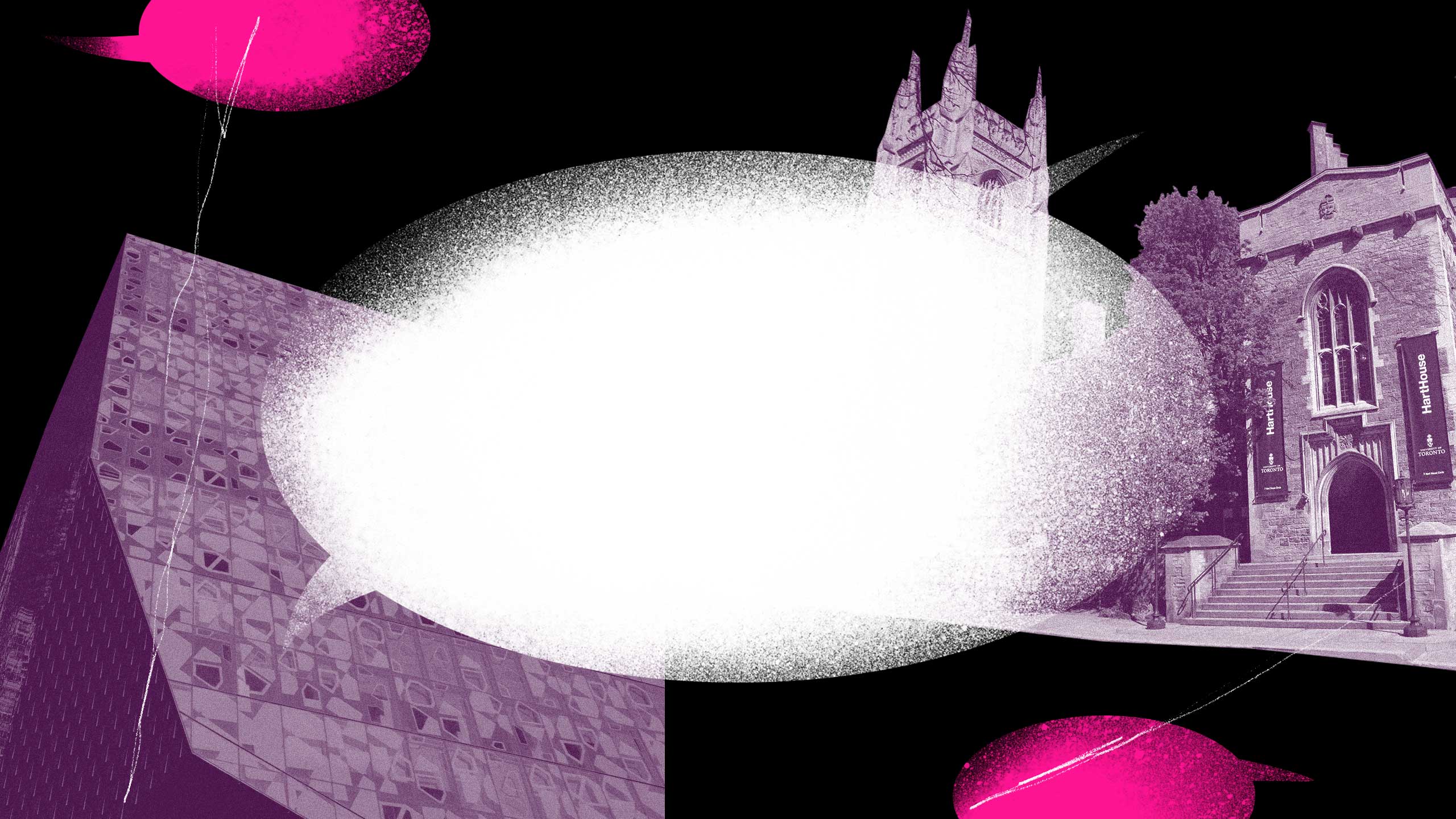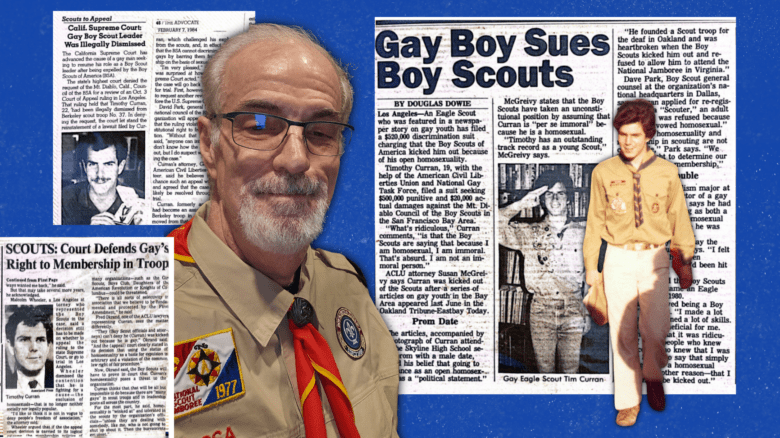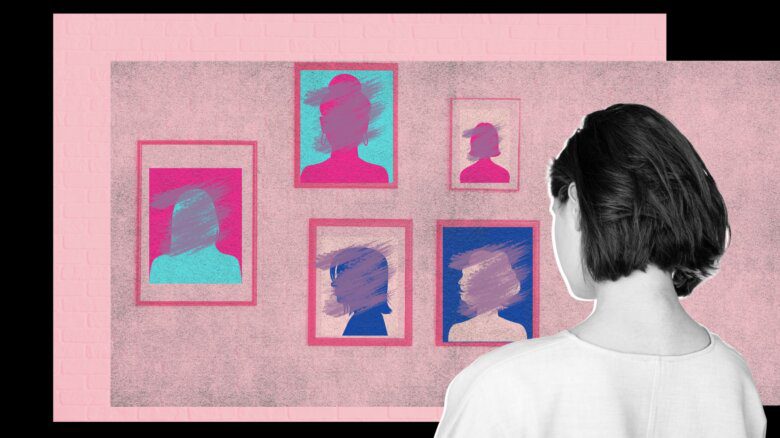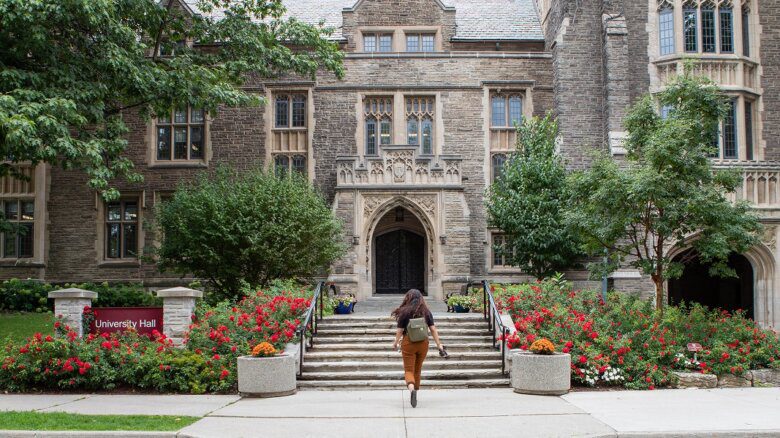Universities across Canada—and across the world—have been struggling with how to balance freedom of speech with students’ desire to feel safe and empowered during their time in academia. Two recent cases in Toronto, at institutions just a couple of kilometres from each other, demonstrate how these issues can play out on campus, and how right-wing media has been leveraging such debates for clickbait—all while ignoring the serious ongoing problems faced by students on the margins.
At Ryerson University, the controversy started with a single student. Last year, fourth-year journalism student Jonathan Bradley was writing for the student newspaper The Eyeopener when non-public direct messages from a 2017 exchange between him and another student were leaked on Twitter. In the messages, Bradley explained that, as a Roman Catholic, he thinks homosexuality is a sin: “I realized when I got in touch with my religion that the world is secularized, and people have forgotten what God told people in the Bible,” reads one sentence in the now-deleted screenshots of the direct messages.
His online interlocutor posted screenshots of the conversation, tagging The Eyeopener and the official Ryerson School of Journalism accounts. Bradley responded to the leak via Twitter, writing that “Everyone is entitled to their opinions, including the Bible. The Bible’s 2,000 years old. How old are you?” He also issued a notice of libel to the student, even though Bradley had already publicly stated his views on homosexuality and “transvestitism.” The online interlocutor removed the post and tweeted out a public apology to Bradley.
The leaked direct messages did not go unnoticed by The Eyeopener, which is colloquially called The Eye. In June 2020, Bradley was informed by the paper’s editor-in-chief that his comments had made him a potentially toxic presence for queer staff and volunteers, and that he would no longer be allowed to contribute.
“You are entitled to your opinion and are free to express it online; The Eyeopener cannot and would not control that. However, we are responsible for ensuring that our Eye community— including sources, contributors, readers and editors—feel safe and comfortable in working with The Eyeopener and coming into our space,” wrote editor-in-chief Catherine Abes in an email to Bradley.
Months later, Bradley filed a complaint with the Human Rights Tribunal of Ontario against Rye Eye Publishing Inc., the not-for-profit entity that publishes the student-run paper, claiming that The Eye had violated his religious rights. He is seeking damages of $20,000.
“Students began tweeting their frustration with the school, citing repeated instances of homophobia, transphobia and racism within its classrooms.”
By January of this year, the Bradley case had touched a nerve across campus, particularly in the journalism department. Students began tweeting their frustration with the school, citing repeated instances of homophobia, transphobia and racism within its classrooms. The administration remained silent, issuing no public statement for days and refusing to comment. A number of Ryerson faculty members, many of whom are racialized, untenured instructors, distanced themselves from the school’s inaction, publicly proclaiming their support of LGBTQ2S+ and BIPOC students. Dozens of students took to Twitter demanding the school say something to condemn homophobia and transphobia on campus, and to commit to fostering a safer environment for its queer and trans students. Bradley, too, took to Twitter, threatening to sue many of his fellow students for defamation.
When the school refused to issue a statement, dozens of concerned students “occupied” an online general meeting in February. At the town hall-style meeting, usually sparsely attended, journalism students have direct access to the faculty’s chair and associate chair. Following a number of impassioned statements from students, undergraduate program director Lisa Taylor equated their calls for immediate action to former President Donald Trump’s attempts to undermine the results of the 2020 United States election. “If you were bothered by that leader’s decision to skip due process to try to affect decision-making bodies like the Supreme Court, you’ll understand why,” Taylor said, “there’s a lot of really good reasons to let a public body as significant as the Ontario Human Rights Commission deal with the matter.”
Meanwhile, a similar situation unfolded starting in February at the University of Toronto, the larger of the two institutions, when Arjun Singh, a political science student, was awarded the David Rayside Undergraduate Scholarship. The $1,000 scholarship is awarded each year, particularly to students who have “enhanced inclusion of historically marginalized populations: for example, racialized minorities, women, Indigenous communities, immigrants and refugees, people with disabilities, sexual minorities.”
Following the award, University of Toronto’s campus paper The Varsity published a story about how Singh has made a number of anti-immigrant statements; he said on Twitter that undocumented migrants should be deported because they “support organized crime,” and that they should be separated from their children. The award also drew attention to Singh’s personal blog, where, in a 2018 post, he writes that “‘believing survivors’ serves to unwittingly propagate systemic sexism that accused men are ‘likely’ to be guilty, and women are ‘likely’ to be honest—both of which are dangerous to justice.”
University of Toronto students immediately organized against Singh being the recipient of the award. Two petitions calling for the university to revoke Singh’s scholarship accumulated more than 5,000 signatures. The university, though, stood its ground. In a one-paragraph statement published on its website, the department of political science refused to rescind the scholarship, stating that “all of the scholarships were awarded in a manner that was consistent with the rules set out in the application process.”
Right-wing media ran with stories about both of these cases. Stepping up to bat for Bradley, Barbara Kay published a heavily editorialized timeline of Bradley’s case in the right-wing blog The Post Millennial. Kay’s other home base, the National Post, published a news article that leaned heavily into Bradley’s side of the story, including only a brief statement from The Eye’s editor-in-chief in the article’s final paragraph. The National Post’s founder, Conrad Black, predictably, also wrote a piece equating Bradley not getting to write for The Eye to… the death of society. “If the informal coalition of militant and merely dismissive atheists and anti-theists actually stamps out official toleration of godliness and spirituality, it will create a vacuum that humans cannot resist the temptation to occupy,” wrote Black. Meanwhile, Kay also wrote in the National Post in defence of Singh, suggesting he was one of “a diminishing few still boldly thrust[ing] their heads above the parapet.” Perhaps not coincidentally, Bradley himself also writes for The Post Millennial and the National Post.
“These debates are rarely about a genuine and good faith desire for open, respectful dialogue.”
That Canada’s most notorious right-wing voices leapt at the opportunity to publicize these stories doesn’t come as much of a surprise. Writers like Kay and Black are drawing on well-worn arguments from right-wing defenders of “freedom of speech” that date back to the 1990s panic over “political correctness.” Then, as now, these debates were rarely about a genuine and good faith desire for open, respectful dialogue but rather a reflection of establishment anxiety over losing even the slightest degree of power and advantage. Many of today’s free-speech advocates traffic in the same terms of victimization for the same reason, but also because it’s a good grift: There is serious money to be made in building a brand identity as a victim of “cancel culture”—just ask Jordan Peterson, who sold more than 3 million copies of his book 12 Rules for Life.
But the impact of these views should not be dismissed. As these campus free-speech debates (over immigration, trans rights, marriage equality, Black Lives Matter) get taken up more broadly, what is often not recognized is that for people who are marginalized, they are not a neutral sharing of different opinions within an equitable and fair arena. They come with a material cost. Four years of former U.S. president Donald Trump has exposed how a stream of hateful disinformation can spark a torrent of hate crimes and even drive an insurrection.
What the defenders of Bradley and Singh are missing is an understanding of the lives of students who feel marginalized by the system that is supposed to be equitable and inclusive, and the ongoing failure of institutions to make them feel heard and welcome. To assess the Bradley or Singh cases as individual incidents is to miss this larger picture of the ongoing experience of queer and trans students even when—especially when— these controversies are not blowing up in the media.
“The administration seemed to shrug as if the issues raised by the petition weren’t valid.”
In the Bradley controversy, the failure of top faculty at Ryerson’s School of Journalism’s to initially declare that their queer and trans students deserve to feel safe in their classrooms was, to the students themselves, a mere moment in the ongoing silence around these issues. When a statement of support for LGBTQ2S+ students did come, it was in the form of a convoluted and non-committal six-part Twitter thread, using social media to answer serious concerns further marginalized the issues at hand. At the same time, the content of the tweets offered no tangible resources to address the issues that had been raised.
In Singh’s case, the students got even less: They got to watch the $1,000 set aside for a student fighting for social justice go to a student who seemed, at best, indifferent to social justice. The administration seemed to shrug as if the issues raised by the petition weren’t valid.
All this silence and indifference comes at a time when universities are increasingly being recognized as hotspots for mental health crises. The Fulcrum, the University of Ottawa student newspaper, reported protests and demonstrations after a slew of student suicides last year. Calls for better mental health services at the University of Toronto ramped up last year following a number of suicides there, too. It is well-documented that marginalized groups experience much higher rates of poor mental health, which makes it impossible to extricate these universities’ lack of support for queer, trans and racialized students from their continued failure to address the ongoing on-campus mental health crisis.
Eventually, silence and lip service won’t suffice. Campus life is becoming increasingly difficult: Tuition prices are rising faster than inflation rates, pandemic learning is burning students out and universities are finding themselves on the edge of a socio-political precipice. Students are more connected to each other than ever before, and they’re beginning to organize to create more equity in their schools.
Guaranteeing the basic safety of their most vulnerable students should be the number one priority of university administrations. Shifting the dial toward those students can be accomplished by listening to, affirming and taking material actions based upon their activism. The handling of the cases of Singh and Bradley, more than anything, demonstrate a lack of empathy for the students who need it most. Universities shouldn’t merely be offering excuses after a debate has embarrassed them. They should be treating their marginalized students, including queer and trans students, with dignity at all times.


 Why you can trust Xtra
Why you can trust Xtra


